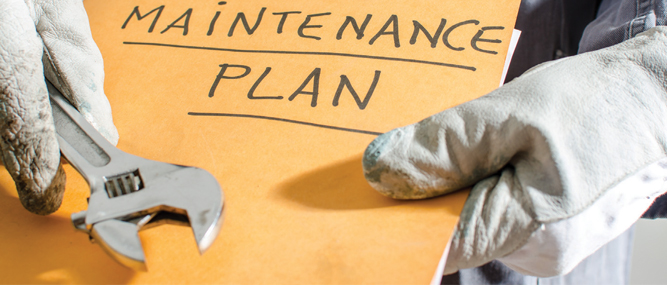Objects in motion will stay in motion, particularly when the power source and activation technology in a piece of equipment is properly maintained. This column is the second in a three-part series on proper maintenance best practices for nailing machinery. It covers specific ideas on how best to keep the power source behind your machinery functioning properly.
Pneumatics
Air leaks affect the ability of the machine to operate. Not only do you have extra noise, but it also puts stress on the air compressor. Like hydraulic leaks, these can be fixed most times with relatively inexpensive parts by replacing such items as seal kits, cylinders, and air valves. Some air leaks are as simple as just tightening a hose clamp or replacing a fitting.
Every air leak that can be heard costs an average $100 a year in electricity.
If the air leak is coming from the exhaust on your valve manifold, the problem is air that is bypassing around the piston in a cylinder. You can locate the cylinder that is bad by removing the non-pressurized hose and checking to see if there is air coming out of the cylinder. If air is coming out, the cylinder is bad.
The pneumatic air supply system should be equipped with air dryers. They save a lot of headaches. When water and oil mix, it gums up valves. Water alone makes internal parts rusty. Air dryers also help keep your nailing tools performing properly. Dry air eliminates the white foam in the top of the tools, which affects how the gun operates. Less water equals more up time.
The air compressor and air dryer are two of the most important things needed in a plant but are usually neglected. They are usually in a room off in a corner. They get turned on Monday morning and do not get looked at until the plant is shut down at the end of the week.
A routine maintenance schedule should be in place for the air compressor and air dryer. Follow the manufacturer’s recommended schedule. When the compressor goes down, the plant is down. Hook-ups for portable air compressors should be plumbed in so that if a compressor goes down hard, a rental unit can be brought in and hooked up quickly.
Hydraulics
Prices are high for a drum of hydraulic oil. Oil leaks not only cost you money in oil, but they also can be a safety hazard, contributing to slips and falls, along with a fire hazard. They can also affect how sensors function and collect sawdust in and around the machine. Oil leaks can be fixed relatively cheaply with simple seal kits that can be done in-house or at a local hydraulic shop.
For hydraulic systems, make sure that the oil coolers are kept clean; set up a schedule as to when they will be cleaned.
Oil filters should be changed at the recommended interval. A lot of debris gets into the oil tanks. Whether it is metal from cylinders and motors or rubber from hoses or sawdust that gets into the tanks, the filters are your best defense in protecting the hydraulic system.
Make sure to check with the original equipment manufacturer to see if there are suction filters on the inside of the tank. When changing filters and oil, it is a good idea to take the tank lid off and check inside for debris. This way you can clean out the system and start fresh with the new filters and oil.
When possible write on filters with a permanent marker the date and machine or pump hours at time of change. This way you can take a quick visual at the machine and know when the filter needs to be changed again instead of having to look up records in a book.
Electrical
At least once a year, tighten terminal strip screws, motor contactor screws, and contact block screws. Vacuum out panels. Buy a little shop vac. Do not blow out the panels with air because it can cause all kinds of problems. Wires come out of place, and debris gets lodged in places.
Make sure that panel switches are tight and do not move. When they come loose and move, wires get pulled out from the contact blocks. This not only can impair functions, it can also cause short circuits, leading to more problems.
Sensors should be checked to make sure they are tight. If they come loose and get hit by lumber or other moving parts, they can be destroyed, causing more down time. When replacing sensors check to see if there are any settings that need to be made. Look at the old sensor to verify or call the manufacturer.
Editor’s Note: Dustin Johnson operates his own business, Johnson’s Automated Machinery Repair. He also performs machinery maintenance for Viking Pallet in Maple Grove, Minnesota., and he provides sales and service for Corali-U.S.A. He was an employee of Viking Engineering from 1994-2006, building and later servicing Viking automated nailing systems. For questions or to contact Dustin, send him an email at jamrsvc@gmail.com.




